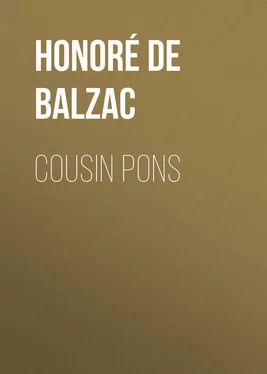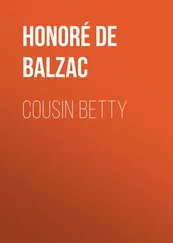Honoré Balzac - Cousin Pons
Здесь есть возможность читать онлайн «Honoré Balzac - Cousin Pons» — ознакомительный отрывок электронной книги совершенно бесплатно, а после прочтения отрывка купить полную версию. В некоторых случаях можно слушать аудио, скачать через торрент в формате fb2 и присутствует краткое содержание. Жанр: literature_19, foreign_antique, foreign_prose, на английском языке. Описание произведения, (предисловие) а так же отзывы посетителей доступны на портале библиотеки ЛибКат.
- Название:Cousin Pons
- Автор:
- Жанр:
- Год:неизвестен
- ISBN:нет данных
- Рейтинг книги:3 / 5. Голосов: 1
-
Избранное:Добавить в избранное
- Отзывы:
-
Ваша оценка:
- 60
- 1
- 2
- 3
- 4
- 5
Cousin Pons: краткое содержание, описание и аннотация
Предлагаем к чтению аннотацию, описание, краткое содержание или предисловие (зависит от того, что написал сам автор книги «Cousin Pons»). Если вы не нашли необходимую информацию о книге — напишите в комментариях, мы постараемся отыскать её.
Cousin Pons — читать онлайн ознакомительный отрывок
Ниже представлен текст книги, разбитый по страницам. Система сохранения места последней прочитанной страницы, позволяет с удобством читать онлайн бесплатно книгу «Cousin Pons», без необходимости каждый раз заново искать на чём Вы остановились. Поставьте закладку, и сможете в любой момент перейти на страницу, на которой закончили чтение.
Интервал:
Закладка:
In the year 1835, chance avenged Pons for the indifference of womankind by finding him a prop for his declining years, as the saying goes; and he, who had been old from his cradle, found a support in friendship. Pons took to himself the only life-partner permitted to him among his kind – an old man and a fellow-musician.
But for La Fontaine’s fable, Les Deux Amis , this sketch should have borne the title of The Two Friends ; but to take the name of this divine story would surely be a deed of violence, a profanation from which every true man of letters would shrink. The title ought to be borne alone and for ever by the fabulist’s masterpiece, the revelation of his soul, and the record of his dreams; those three words were set once and for ever by the poet at the head of a page which is his by a sacred right of ownership; for it is a shrine before which all generations, all over the world, will kneel so long as the art of printing shall endure.
Pons’ friend gave lessons on the pianoforte. They met and struck up an acquaintance in 1834, one prize day at a boarding-school; and so congenial were their ways of thinking and living, that Pons used to say that he had found his friend too late for his happiness. Never, perhaps, did two souls, so much alike, find each other in the great ocean of humanity which flowed forth, in disobedience to the will of God, from its source in the Garden of Eden. Before very long the two musicians could not live without each other. Confidences were exchanged, and in a week’s time they were like brothers. Schmucke (for that was his name) had not believed that such a man as Pons existed, nor had Pons imagined that a Schmucke was possible. Here already you have a sufficient description of the good couple; but it is not every mind that takes kindly to the concise synthetic method, and a certain amount of demonstration is necessary if the credulous are to accept the conclusion.
This pianist, like all other pianists, was a German. A German, like the eminent Liszt and the great Mendelssohn, and Steibelt, and Dussek, and Meyer, and Mozart, and Doelher, and Thalberg, and Dreschok, and Hiller, and Leopold Hertz, Woertz, Karr, Wolff, Pixis, and Clara Wieck – and all Germans, generally speaking. Schmucke was a great musical composer doomed to remain a music master, so utterly did his character lack the audacity which a musical genius needs if he is to push his way to the front. A German’s naivete does not invariably last him through his life; in some cases it fails after a certain age; and even as a cultivator of the soil brings water from afar by means of irrigation channels, so, from the springs of his youth, does the Teuton draw the simplicity which disarms suspicion – the perennial supplies with which he fertilizes his labors in every field of science, art, or commerce. A crafty Frenchman here and there will turn a Parisian tradesman’s stupidity to good account in the same way. But Schmucke had kept his child’s simplicity much as Pons continued to wear his relics of the Empire – all unsuspectingly. The true and noble-hearted German was at once the theatre and the audience, making music within himself for himself alone. In this city of Paris he lived as a nightingale lives among the thickets; and for twenty years he sang on, mateless, till he met with a second self in Pons. [See Une Fille d’Eve .]
Both Pons and Schmucke were abundantly given, both by heart and disposition, to the peculiarly German sentimentality which shows itself alike in childlike ways – in a passion for flowers, in that form of nature-worship which prompts a German to plant his garden-beds with big glass globes for the sake of seeing miniature pictures of the view which he can behold about him of a natural size; in the inquiring turn of mind that sets a learned Teuton trudging three hundred miles in his gaiters in search of a fact which smiles up in his face from a wayside spring, or lurks laughing under the jessamine leaves in the back-yard; or (to take a final instance) in the German craving to endow every least detail in creation with a spiritual significance, a craving which produces sometimes Hoffmann’s tipsiness in type, sometimes the folios with which Germany hedges the simplest questions round about, lest haply any fool should fall into her intellectual excavations; and, indeed, if you fathom these abysses, you find nothing but a German at the bottom.
Both friends were Catholics. They went to Mass and performed the duties of religion together; and, like children, found nothing to tell their confessors. It was their firm belief that music is to feeling and thought as thought and feeling are to speech; and of their converse on this system there was no end. Each made response to the other in orgies of sound, demonstrating their convictions, each for each, like lovers.
Schmucke was as absent-minded as Pons was wide-awake. Pons was a collector, Schmucke a dreamer of dreams; Schmucke was a student of beauty seen by the soul, Pons a preserver of material beauty. Pons would catch sight of a china cup and buy it in the time that Schmucke took to blow his nose, wondering the while within himself whether the musical phrase that was ringing in his brain – the motif from Rossini or Bellini or Beethoven or Mozart – had its origin or its counterpart in the world of human thought and emotion. Schmucke’s economies were controlled by an absent mind, Pons was a spendthrift through passion, and for both the result was the same – they had not a penny on Saint Sylvester’s day.
Perhaps Pons would have given way under his troubles if it had not been for this friendship; but life became bearable when he found some one to whom he could pour out his heart. The first time that he breathed a word of his difficulties, the good German had advised him to live as he himself did, and eat bread and cheese at home sooner than dine abroad at such a cost. Alas! Pons did not dare to confess that heart and stomach were at war within him, that he could digest affronts which pained his heart, and, cost what it might, a good dinner that satisfied his palate was a necessity to him, even as your gay Lothario must have a mistress to tease.
In time Schmucke understood; not just at once, for he was too much of a Teuton to possess that gift of swift perception in which the French rejoice; Schmucke understood and loved poor Pons the better. Nothing so fortifies a friendship as a belief on the part of one friend that he is superior to the other. An angel could not have found a word to say to Schmucke rubbing his hands over the discovery of the hold that gluttony had gained over Pons. Indeed, the good German adorned their breakfast-table next morning with delicacies of which he went in search himself; and every day he was careful to provide something new for his friend, for they always breakfasted together at home.
If any one imagines that the pair could not escape ridicule in Paris, where nothing is respected, he cannot know that city. When Schmucke and Pons united their riches and poverty, they hit upon the economical expedient of lodging together, each paying half the rent of the very unequally divided second-floor of a house in the Rue de Normandie in the Marais. And as it often happened that they left home together and walked side by side along their beat of boulevard, the idlers of the quarter dubbed them “the pair of nutcrackers,” a nickname which makes any portrait of Schmucke quite superfluous, for he was to Pons as the famous statue of the Nurse of Niobe in the Vatican is to the Tribune Venus.
Mme. Cibot, portress of the house in the Rue de Normandie, was the pivot on which the domestic life of the nutcrackers turned; but Mme. Cibot plays so large a part in the drama which grew out of their double existence, that it will be more appropriate to give her portrait on her first appearance in this Scene of Parisian Life.
Читать дальшеИнтервал:
Закладка:
Похожие книги на «Cousin Pons»
Представляем Вашему вниманию похожие книги на «Cousin Pons» списком для выбора. Мы отобрали схожую по названию и смыслу литературу в надежде предоставить читателям больше вариантов отыскать новые, интересные, ещё непрочитанные произведения.
Обсуждение, отзывы о книге «Cousin Pons» и просто собственные мнения читателей. Оставьте ваши комментарии, напишите, что Вы думаете о произведении, его смысле или главных героях. Укажите что конкретно понравилось, а что нет, и почему Вы так считаете.












